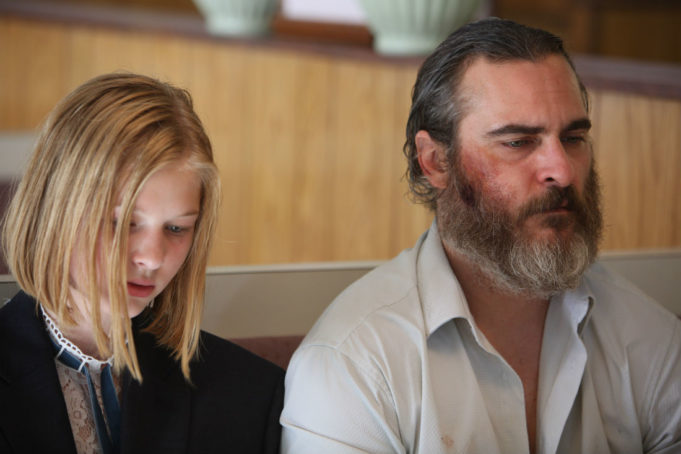If you know the name of Lynne Ramsay, it may very well be from a public spat with the producers of the Western Jane Got a Gun, which culminated in the Scottish director failing to show up to work on the first day of shooting and gaining a reputation (fairly or not) as a malcontent. I caught her first new film in six years, You Were Never Really Here, at AMC Grapevine Mills this weekend, and I was reminded of why I missed her. She adapts Jonathan Ames’ bear-paw swipe of a novelette and turns what could have been a lurid potboiler into a bracingly strange thriller centering around its protagonist’s troubled head.
That protagonist is Joe (Joaquin Phoenix), a war veteran who now specializes in tracking down missing girls on an unofficial basis in New York City. Though he owns a gun, he prefers to use a hammer on the frequent occasions when his job calls for violence. He gets hired by a powerful state senator (Alex Manette) to find the man’s 14-year-old daughter Nina (Ekaterina Samsonov), who’s been kidnapped and forced into sex slavery in some hole in the city. Joe locates the girl and gets to use his hammer on the guys with her, but the job goes spectacularly wrong while he’s delivering her back to her dad, and he’s forced to track her to the source of the corruption.
If you haven’t seen her previous movies like We Need to Talk About Kevin or Morvern Callar, this is a pretty good introduction to Ramsay’s unorthodox, clipped style. The movie runs at 90 minutes even and there isn’t a single wasted moment, but it doesn’t feel taut. Instead, she’s good at capturing the rhythms of Joe’s solitary life, where his adherence to his routine is one of the few things keeping his brain together. He’s a patient man, whether he’s on a stakeout or stalking through his house looking for hit men, and the movie adopts his rhythms. Ramsay finds time for telling little details like a short-lived motel clerk idly tapping his cigarette lighter on his desk while eating French fries straight from the carton. Micro-flashbacks allude to Joe’s war experience in Afghanistan and his even more traumatic childhood, which explains why he occasionally feels the need to asphyxiate himself with plastic bags. Of course, sometimes she goes too far in the direction of austerity; if you haven’t read the book, you won’t know why Joe gets attacked by a random dude in an alley in Cincinnati. Then again, the brutal proficiency with which Joe deals with the guy is the real take-away from that scene.
I like the way that Ramsay uses the soundtrack to depict the chaos in Joe’s head. The noises of an ordinary New York street and the countryside upstate become unbearably cacophonous before fading to white noise, and when Joe rescues Nina and enacts his violence on her client, we hear her counting silently to herself while she impassively watches the horrific beating. That scene is emblematic of Ramsay’s approach; while the story is filled with unspeakable violence, she often films it obliquely, focusing on a rain-streaked car window as Joe snatches a delivery boy for the sex den off the street, or on a cracked mirror as he fights for his life against a crooked cop.
Ramsay extends the web of corruption considerably from Ames’ novel, and the traumas that pile up on Joe are such that you might accuse her of indulging in misery for its own sake. Yet she also brings the narrative to a halt so we can watch Joe give his aging mother (Judith Roberts) a decent burial even while people are hunting him. The ending is much more hopeful than the book’s, too, as this suicidal man who has gone to seed finds a reason to keep going. Somehow, You Were Never Really Here avoids all the traps and manages to stand on its own.
You Were Never Really Here
Starring Joaquin Phoenix and Ekaterina Samsonov. Written and directed by Lynne Ramsay, based on Jonathan Ames’ novel. Rated R.












